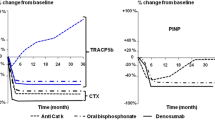Abstract.
Biochemical markers of bone turnover are finding increased application in the investigation and management of skeletal diseases such as osteoporosis. The present study assessed for the first time the diurnal variation of serum type I collagen cross-linked N-telopeptides (NTx), a new serum-based marker of bone resorption, and the effect of antiresorptive therapy with alendronate on this marker in elderly osteopenic women. The concentrations of serum NTx were monitored over 24 hours in a randomly selected subset of 38 women (placebo n = 13, 69 ± 3 (SD) year; alendronate n = 25, 69 ± 3 year), who had completed 12–15 months of a larger (n = 120) randomized, double-blind, parallel group, placebo-controlled trial with alendronate 5 mg/day. Blood was obtained every 4 hours for measurement of serum NTx using a new chemiluminescent-based immunoassay. There was a significant diurnal variation of serum NTx (p = 0.001) in both the placebo and alendronate groups. Mean peak levels occurred at ∼0504 h with a mean nadir at ∼1320 h in the placebo group, with no significant difference on alendronate. Serum NTx was ∼25% lower in the alendronate group over the entire 24-hour period. Mean (SE) daytime (0800–2000) and nighttime (2200–0800) serum NTx values were 6.40 ± 0.30 versus 8.45 ± 0.58 nmol BCE/liter, and 7.42 ± 0.23 versus 10.01 ± 0.53 nmol BCE/liter for alendronate versus placebo, respectively (P≤ 0.003 for both comparisons). Combining the data of both treatment groups, serum NTx was significantly (P < 0.05) correlated with serum osteocalcin (r = 0.753) and urine NTx (r = 0.628) measurements previously obtained over the entire 24-hour period. Serum NTx has a significant diurnal variation and is responsive to antiresorptive therapy with alendronate. Alendronate reduces the amplitude but maintains the pattern of the 24-hour serum NTx profile. These data suggest that serum NTx may be a useful new marker of bone resorption.
Similar content being viewed by others
Author information
Authors and Affiliations
Additional information
Received: 13 March 1997 / Accepted: 15 October 1997
Rights and permissions
About this article
Cite this article
Gertz, B., Clemens, J., Holland, S. et al. Application of a New Serum Assay for Type I Collagen Cross-Linked N-Telopeptides: Assessment of Diurnal Changes in Bone Turnover With and Without Alendronate Treatment. Calcif Tissue Int 63, 102–106 (1998). https://doi.org/10.1007/s002239900497
Published:
Issue Date:
DOI: https://doi.org/10.1007/s002239900497




